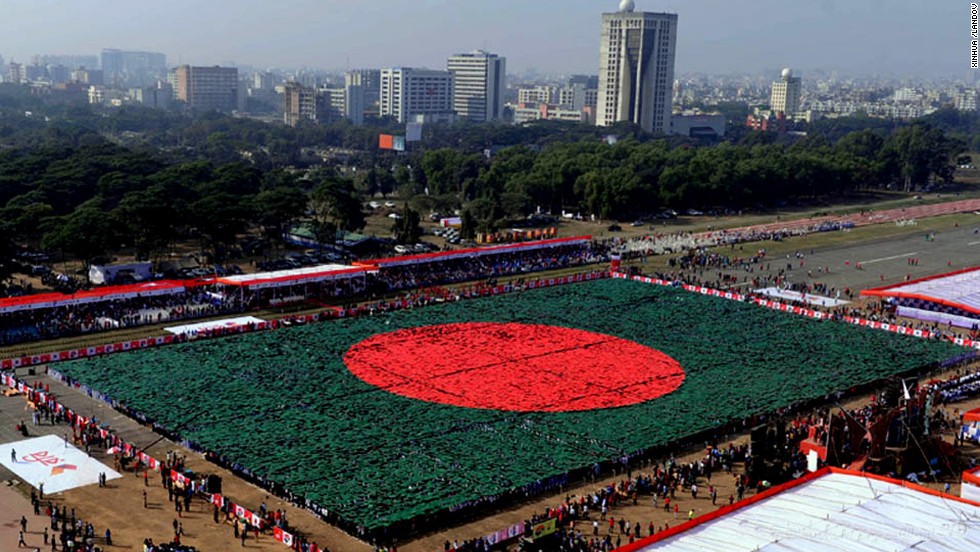
On March 26, 1971, East Pakistan made its first declaration of independence from Pakistan, marking the start of the Bangladesh Liberation War of 1971. The war ended with the surrender of West Pakistan. The subsequent independence led to the establishment of the People’s Republic of Bangladesh. Today, the nation stands as a resilient player in Asia, with a growing economy and a stable democracy.
The India-Pakistan partition of 1947, gave Pakistan two separate regions. One was on the West of India, termed West Pakistan (present-day Pakistan) and the other fell on the subcontinent’s East, initially termed East Bengal and later East Pakistan (present-day Bangladesh). Both regions comprised Muslim-majority populations.
Despite sharing common religious beliefs, East and West Pakistan were separated by language and culture. In 1948, founder of Pakistan Muhammad Ali Jinnah announced that “Urdu, and only Urdu” would be the official language of the nation. This created conflict as the native language of East Pakistan, comprising 30% of the total population, was Bengali.

In 1948, civilians from the East protested against the removal of Bengali from the stamps and currency. The demonstrations became known as the Bengali Language Movement. It ended on February 21, 1952, with several deaths as the Pakistani police opened fire on students and civilians.
Since independence, each year February 21 is commemorated as National Language Day in Bangladesh. Honouring the memory of the martyred, in 1999, UNESCO recognised the date as International Mother Language Day.
In 1970, East Pakistani political party, Awami League bagged a landslide win in the region. The party was led by Sheikh Mujibur Rahman, widely accepted as the founding father of Bangladesh. The political victory was ignored by the regime in the West.
A primary ideological difference between the Muslim League and the Awami League was their acceptance of secularism. While the former called for a Muslim-nation, the latter wished for a secular system.
Growing cultural nationalism and political dissent in the East was suppressed by the West through armed forces. On March 25, 1971, the Pakistani Army launched Operation Searchlight to end the Bengali Nationalist Movement.
The estimated numbers of deaths vary from several hundred thousand to over a million. Despite discrepancies, most researchers have referred to the operation as an act of genocide.
Right before the Pakistani Army arrested nationalist leader, Sheikh Mujibur Rahman at 1:30 am on March 26, he declared independence.
He signed a declaration that read, “Today Bangladesh is a sovereign and independent country. On Thursday night, West Pakistani armed forces suddenly attacked the police barracks at Razarbagh and the EPR headquarters at Pilkhana in Dacca. Many innocent and unarmed have been killed in Dhaka city and other places of Bangladesh. Violent clashes between E.P.R. and Police on the one hand and the armed forces of Pakistan on the other, are going on. The Bengalis are fighting the enemy with great courage for an independent Bangladesh. May Allah aid us in our fight for freedom. Joy Bangla [May Bangladesh be victorious].”
The Awami League’s armed wing, Mukti Bahini was at the forefront of the Liberation War. In July, with the help of Indian aid, the armed wing launched Operation Jackpot. The offensive was unable to achieve its objectives.
India extended full support to East Pakistan as early as March 27, 1971. By July, Indian Prime Minister Indira Gandhi recognised Bangladesh as an independence nation. During the war, over 10 million East Pakistani refugees fled to India. The subcontinent’s involvement in the Bangladeshi independence struggle soon turned into a full-fledged armed conflict with Pakistan.
The conflict, which began on December 3, is termed as the Indo-Pak War of 1971. Pakistan surrendered within thirteen days on December 16. The shortest war in the history of the two nations, gave birth to Bangladesh. A democratic parliamentary system of governance was adopted soon after independence.
Today, Bangladesh is one of the biggest exporters of textile in the world. The country’s rapidly developing economy is amongst the top 50 in terms of nominal GDP and top 30 in terms of purchasing power parity.
In Asia, Bangladesh is a founding member of SAARC, BIMSTEC, and the Bangladesh Bhutan India Nepal Initiative. The country is also a member of the OIC, Commonwealth of Nations, the Developing 8, IORA, Group 77, and the World Trade Organisation.








